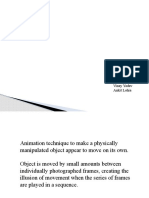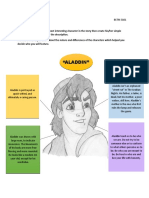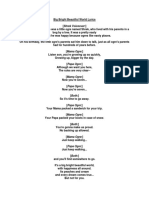0% found this document useful (0 votes)
39 views35 pagesStop Motion Animation
Stop motion animation is a technique where physical objects are moved incrementally and photographed frame by frame to create the illusion of movement. Various forms of stop motion include clay animation, toy-mation, and pixilation, with a rich history dating back to the late 19th century. Notable milestones in the field include works by pioneers like Emile Cohl, Willis O'Brien, and Ray Harryhausen, who advanced the technique significantly throughout the 20th century.
Uploaded by
bkdhanushofficialCopyright
© © All Rights Reserved
We take content rights seriously. If you suspect this is your content, claim it here.
Available Formats
Download as PDF, TXT or read online on Scribd
0% found this document useful (0 votes)
39 views35 pagesStop Motion Animation
Stop motion animation is a technique where physical objects are moved incrementally and photographed frame by frame to create the illusion of movement. Various forms of stop motion include clay animation, toy-mation, and pixilation, with a rich history dating back to the late 19th century. Notable milestones in the field include works by pioneers like Emile Cohl, Willis O'Brien, and Ray Harryhausen, who advanced the technique significantly throughout the 20th century.
Uploaded by
bkdhanushofficialCopyright
© © All Rights Reserved
We take content rights seriously. If you suspect this is your content, claim it here.
Available Formats
Download as PDF, TXT or read online on Scribd
/ 35
























































































